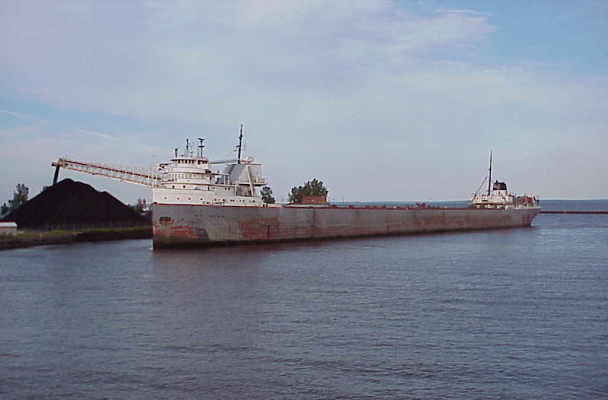Jones Act Case Involving Seaman Alleging Lung Disease Caused by Working on Coal Freighter (Spencer v. Grand River Navigation Co.)

SS Calumet Unloading Coal at Menominee Paper Co. (Photo by Dick Lund http://dlund.20m.com/images/Calumet1c.JPG)
Earlier this week the U.S. Court of Appeals for the Sixth Circuit issued a decision involving a seaman who filed a claim under the Jones Act (the federal law the protects seaman from injuries on the job) due to breathing problems related to coal-dust exposure. The facts of the case provide an interesting example of someone who would probably not be a “miner” under the Black Lung Benefits Act but who alleges breathing problems caused by coal dust. (For other examples previously covered on this blog, recall the workers at the Indiana coal slag processing plant, or the neighbor of the Kentucky coal processing plant.)
The Sixth Circuit’s decision in Spencer v. Grand River Navigation Co. (decision here) described the facts as follows:
Plaintiff Darryle Spencer was employed by Grand River for several years as a conveyor man and served as a member of the crew of the Calumet, a freighter sailing on the Great Lakes. The Calumet is owned and operated by Grand River. Spencer alleges he was exposed to excessive amounts of coal dust and other hazardous substances while unloading the vessel in a poorly ventilated cargo tunnel. On July 26, 2011, he sent a letter to Grand River advising that he had been hospitalized for breathing problems and had been diagnosed with advanced COPD. The letter further advised that Spencer, on his doctor’s recommendation, was resigning his position as a merchant mariner, effective immediately. . . .
In February 2012, Spencer received an invitation from Grand River to return to work as a crew member during the 2012 season. As a prerequisite, he was required to obtain a physical examination and return the completed Coast Guard medical evaluation form in time for vessel assignments in early March. Spencer obtained the physical examination and returned the completed form, dated February 22, to Grand River. Signed by Blake M. Slater, D.O., the form certified that Spencer was “competent” to perform merchant mariner duties. Dr. Slater disclosed that Spencer suffered from asthma and COPD, but considered the conditions “controlled” by use of inhalers and medications, i.e., “Spiriva, Bonvana, [and] Alberto/NS nebulizer,” which Spencer was instructed to keep on board. R. 11-1, Med. Eval. Rept., Page ID 76–84. Spencer explained that Dr. Slater told him “it was ‘my decision’ whether to return to work with Grand River Navigation Company, on the condition that I would be able to take all of my prescribed medications and therapies while at work.” R. 11-1, Spencer Affidavit ¶ 10, Page ID 63.
Spencer thereafter returned to work for Grand River as a conveyor man during the 2012, 2013, and 2014 sailing seasons. He was exposed to coal dust during this time, but he was able to take all prescribed medications and therapies. In early 2015, however, Spencer was advised not to return to work, even if he were able to take all prescribed medications and therapies, and he has abided by this advice.
Spencer commenced this action in the Eastern District of Michigan in April 2015. He alleges that exposure to coal dust aggravated his pre-existing asthma and COPD condition. In Count I of the complaint, he alleges under the Jones Act that he suffered permanent injury as a seaman due to Grand River’s negligence in failing to provide a reasonably safe work place. Count II is a second claim under the Jones Act, alleging Grand River breached its express and implied warranty that the Calumet was reasonably seaworthy. In Count III, Spencer alleges Grand River has breached its duty to provide “maintenance and cure” necessitated by his injury. Finally, in Count IV, Spencer alleges that Grand River is equitably estopped from asserting a statute of limitations defense because Grand River misled him to believe that he could safely return to work after he was diagnosed with COPD in July 2011.
The issue before the Sixth Circuit was the timeliness of Spencer’s complaint. The Court affirmed the District Court’s dismissal of Counts I & II, but reversed the District Court’s dismissal of Count III holding that Spencer should be able to go forward with his “maintenance and cure” theory.
Spencer suggests a theory that some workers who were injured by coal dust but who cannot seek benefits under the Black Lung Benefits Act may consider.